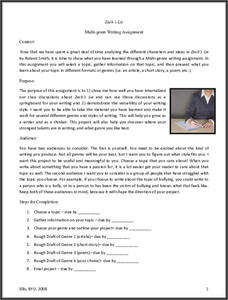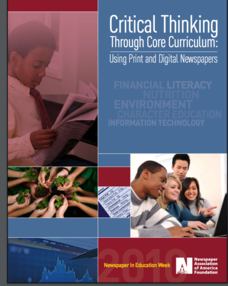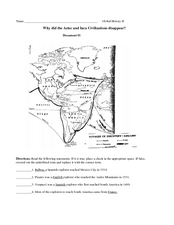iCivics
Step Four: Working with Websites
Almost every profession today relates to websites in some way! The resource tasks the class to fill out three individual graphic organizers to help them analyze each website they visit.
iCivics
Step 3: Become an Expert
Have you ever been called an expert before? Pupils analyze how to break down sources of information using group work and individual skills. They begin to understand the tools of becoming an expert on a topic by using subtopics and...
Social Media Toolbox
Social Media Usage
Is there a difference in the way organizations present news via social media and in print? The third in a series of 16 lessons from The Social Media Toolbox explores news outlets and their delivery methods. Groups follow a story for a...
Novelinks
Touching Spirit Bear: Question Answer Response Strategy
What types of questions help readers learn the most? Sixth, seventh, and eighth graders learn how to ask four types of questions from the Question Answer Response (QAR) reading strategy to help grow their comprehension of Touching Spirit...
Novelinks
Touching Spirit Bear: The Literary Mandala
Even someone with a dark side can make a good decision—and vice versa. Readers explore Cole's traits and decisions in Ben Mikaelson's Touching Spirit Bear and analyze his sunside and...
Novelinks
The Westing Game: Anticipation Guide
Are all criminals bad people? Pupils answer this and other compelling questions in an anticipation guide for The Westing Game by Ellen Raskin. Designed for learners to complete before reading the text, the...
Novelinks
Zach’s Lie: Multi-Genre Writing Assignment
How do people solve problems in healthy ways? Writers explore a topic of interest in their multi-genre writing assignment exploring Zach's Lie. The final resource in a series of seven includes multiple scaffolds and organizers for...
Media Education Lab
Propaganda Techniques
In an age of fake news, alternative facts, and biased reporting, it is more important than ever that 21st century learners develop the critical-thinking skills necessary to recognize, analyze and resist the propaganda techniques used in...
Newspaper Association of America
Critical Thinking through Core Curriculum: Using Print and Digital Newspapers
What is and what will be the role of newspapers in the future? Keeping this essential question in mind, class members use print, electronic, and/or web editions of newspapers, to investigate topics that include financial...
EngageNY
Grade 9 ELA Module 1, Unit 2, Lesson 2
Class members continue their analysis of Letters to a Young Poet, paying particular attention to how Rilke uses metaphor to develop his ideas about the source of inspiration.
EngageNY
Grade 12 ELA Module 1: Unit 1, Lesson 1
Here's a fresh approach to the dreaded personal narrative required by most college applications. The Autobiography of Malcolm X is the anchor text for a unit that, through modeling and guided practice exercises, encourages the...
Curated OER
Tools of Persuasion
Ethos, pathos, and logos. After reading a passage about Aristotle's, three basic tools of persuasion, individuals answer a series of multiple choice comprehension questions and craft responses to three short-answer essay prompts.
Novelinks
The Little Prince: Blooms’ Taxonomy Questions
Question what you read with a lesson based on Bloom's Taxonomy. As kids read The Little Prince by Antoine de Saint-Exupéry, they formulate questions with cues from a graphic organizer, and answer them to work on critical...
City College of San Francisco
Making Inferences: Reading Between the Lines
Have you ever read part of a story and had to figure out what the rest was about? Practice making inferences with several short passages and multiple choice questions.
Macmillan Education
Critical Thinking
Encourage learners to think deeply about the information they read or hear. Through a series of life skills worksheets, your pupils will consider the need for objectivity, identifying missing information, and problem solving.
Curated OER
When Is a Noun a Verb? Examining Double Duty Words
The New York Times' Learning Network provides great lessons! This one uses articles from the paper to help readers understand homonyms like mail (verb and noun). It also includes an exercise in reading informational text. Links to the...
Media Smarts
Media Awareness Network: Hate or Debate?
Discuss the difference between legitimate debate on a political issue and arguments that are based on hate through a science-fiction scenario that shows how a controversial issue can be discussed in both ways. Then learn how purveyors of...
Curated OER
Reading Critically
Develop the techniques needed to analyze and synthesize literature well. No matter what students read, they need to be able to think critically about the material. Give thinkers these tools to effectively ponder and consider the world...
Maine Content Literacy Project
Introduction to Literacy Criticism
As learners continue to examine a short story of their choice, they take some time to look at analysis completed by others on the same story. In the eleventh lesson in a series of fourteen, pupils explore various sites for literary...
Maine Content Literacy Project
Process of Reading
Assist your pupils with literary analysis by discussing and exploring theme. This plan, the twelfth in a series of fourteen, builds in some time to explore theme as a class. Learners also blog about the main event in their stories and...
Curated OER
Reading Club: Sex Ed
If you teach health, sociology, ethics, or a class that addresses controversial issues, this resource related to schools' sex education programs may be useful. The New York Times' Learning Network provides a lengthy article on a unique...
Curated OER
Making Connections
In order to maximize reading comprehension levels, young readers must learn to make connections to the content. This worksheet applies to any reading and provides spaces for readers to document relevent personal experiences, prior...
Curated OER
Why did the Aztec and Inca civilizations disappear?
Middle schoolers can analyze primary source documents to answer the question, "Why did the Aztec and Inca civilizations disappear?" They will read the provided excerpts then answer 11 different questions to uncover the ultimate answer.
Learning Station
Read The Fine Print!
In this warranty reading worksheet, students will read a warranty from a toy company and complete four short answer questions about the guarantee.

























